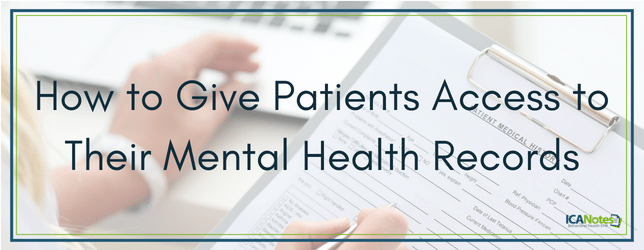How to Give Patients Access to Their Mental Health Records
Ever since the U.S. Congress enacted the Health Insurance Portability and Accountability Act of 1996 and President Bill Clinton signed it into law, health care providers and insurers have come under greater scrutiny about how they collect, store and share patient health and billing information.
As a behavioral healthcare professional, you understand HIPAA is mostly about protecting the privacy of those who receive care. When handling issues related to mental health, preserving a patient’s sensitive health information is a priority for today’s HIPAA-compliant clinics and practices.
Along with privacy, HIPAA is also about the right every patient has to review, inspect, correct and receive a copy of their physical and mental health records. That’s why the manner in which you and your staff access mental health records is as meaningful as how you grant access to patents who wish to review their records.
Of course, for behavioral health professionals who use ICANotes as their Electronic Health Record software, the answer to the question “Where can I find my mental health records?” couldn’t be more simple. With the customizable patient portal, all you have to do is provide patients with access to the portal, where they’ll be guided through its safe, paperless process.
In addition, the ICANotes patient portal is more than HIPAA-compliant. It’s also fully certified as a Meaningful Use Stage 2 patient portal — meaning you and your practice are at the cutting edge of patient engagement.
How to Give Access to a Mental Health Record
It’s helpful to approach patient access to mental health records from the perspective of what patients already have at their disposal from the federal government. For instance, if you have patients who are struggling to understand what HIPAA means to them, it demonstrates good faith on your part to direct them to Your Rights Under HIPAA, sponsored by the U.S. Department of Health & Human Services. On this page, patients can find everything from general fact sheets to HIPAA Right of Access videos that have the option for Spanish language captions.
For patients who are a bit more curious and technically savvy, The Office of the National Coordinator for Health Information Technology has put out The Guide to Getting & Using Your Health Records. Here, they’ll find practical sections relating to health records.
Of course, your patients’ mental health records contain extremely private information, so properly granting access to them is important. Here are some pointers to keep in mind and assist you in staying HIPAA-compliant:
- Rules of Access: Only patients or their legal representatives may have access to their mental health records, and you must obtain a patient’s permission before sharing a copy of their record with a health plan or other provider to assist with billing or continued treatment.
- Permitted Fees: As a healthcare provider, you cannot deny a patient’s access to his or her record, even if that patient has not paid for services you rendered. Moreover, you may not charge a separate retrieval fee for searching for a record. However, you may bill a reasonable price for any costs you incur concerning copying or mailing a record.
- Psychotherapy Notes: While patients have the right to access their mental health records, psychotherapists’ notes are not part of those records and should not be shared with patients. Therapists’ notes should always be kept separately from the patients’ health records. This, of course, is just another reason to use ICANotes, since the software is designed for the safe, HIPAA-compliant management of all data related to your behavioral health practice.
- Corrections: Patients may request that you correct any incorrect information in their mental health records. It’s then your responsibility to make the necessary corrections promptly.
Finally, with electronic health records (EHR) helping make more and more practices go paperless, it’s a good idea to guide patients visiting your website to your Contact Us page, where they should receive clear directions on how to access their records via your patient portal.
For a free trial or live demo, contact ICANotes today.
Related Posts:
Are Mental Health Record Guidelines the Same for Every State?
How Electronic Health Records Are Improving Patient Care
Biggest Challenges Facing Clinical Psychologists in 2018
2018 Updates to the EHR Incentive Program

